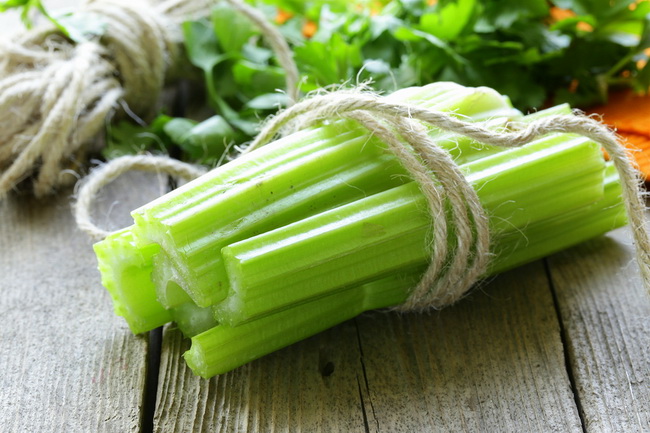- Make It Yourself Lavender Heart-Shaped Bath Bombs!
- 20 Things You Never Knew About “Down There”
- 12 Best Foods For Those Suffering From Arthritis Pain
- 12 Personal Hygiene Mistakes Almost Everyone Makes (Mom Never Told You About #4!)
- 15 Medicinal Plants And Herbs From The Cherokee People
- 12 Mind-Blowing Benefits Of Drinking Coconut Water During Pregnancy
- 12 Outstanding Winter Foods That Won’t Fatten You Up Like A Christmas Turkey
Celery: The Underrated Veggie That May Fend Off Breast Cancer

Photo credit: bigstock.com
Breast cancer is one of the more common forms of cancer, affecting millions of women around the world. According to an estimate by the World Health Organization (WHO), some 508,000 women died of breast cancer in 2011. The disease is more common in developed countries, affecting around 12 percent of women in the United States at some point over the course of their lives. Breast cancer has also slowly become more common in developing regions of the world as well, with around 40 out of every 100,000 women in most East African countries affected, according to the WHO website. (While it’s much less common, breast cancer has been known to occur in men, as well.)
The good news is that breast cancer is considered one of the more treatable forms of cancer and has a high survival rate in most developed countries–around 80 percent in the United States, for example. A key factor in this is early detection. In developing regions of the world, patients may not have access to sophisticated early detection treatment, so in many cases, the women remain unaware of their condition until it’s developed to late-stage cancer. Conventional treatments typically include chemotherapy or surgery.
However, some research indicates that there may be an all-natural way to ward off the risks of breast cancer. A series of recent studies has revealed that celery, of all things, may reduce women’s chances of developing breast cancer, and even halt the progression of the illness in patients who already have it.
According to reports from Green Med Info and Dr. Joseph Mercola, celery’s cancer-fighting abilities can be attributed to certain naturally occurring compounds contained in the vegetable.
The report by Dr. Mercola references a 2011 study at the University of Missouri that brought an exciting development in the field of breast cancer research. The scientists and their researchers wanted to determine if a certain flavonoid found in celery, called apigenin, had any effect on the development of breast cancer cell growth. Many studies have demonstrated that the consumption of green vegetables is linked to a reduced risk of cancer. Now it was time to determine if this particular flavonoid, which is especially common in celery, was a contributing factor to this reduced risk.
Continue to Page 2

Photo credit: bigstock.com
The researchers grafted human breast cancer cells into lab mice, a process known as “xenografting.” These cells quickly and aggressively began to develop into cancerous tumors. All mice were then treated with medroxyprogesterone acetate, or MPA, a progestin treatment which is often given to post-menopausal women. There was also a control group that did not receive MPA.
Next, one half of the MPA-treated mice were given an additional apigenin-based treatment, while the other half received only MPA. In the mice that received the apigenin treatment, the cancerous cell growth began to slow significantly, and tumors began to shrink. Clearly the apigenin was having an inhibitory effect on the cell growth of breast cancer.
“This is the first study to show that apigenin, which can be extracted from celery, parsley and many other natural sources, is effective against human breast cancer cells” commented Salman Hyder, a professor of Tumor Angiogenesis and Biomedical Sciences.
What makes this research especially promising is that apigenin appears to be actually effective, and it lacks the harsh side effects associated with conventional treatments like chemotherapy (hair loss, exhaustion, etc). Obviously, this was a study done on mice, and more research needs to be done, but these results were achieved with human breast cancer cells, so it stands to reason that it could likely be effective in humans as well.
To get more apigenin in your diet, eat more celery! This vegetable is known to have among the highest concentrations of this amazing flavonoid of any food, although it’s found in other vegetables and fruits, including apples, cilantro, broccoli, leeks, oregano, basil, tomatoes, onions and more. Celery should be incorporated into a diet rich in a variety of fruits and vegetables, and makes a healthy and subtle-tasting addition to a smoothie or shake.
READ ALSO: Onions: Nutritional Facts And Health Benefits Video
As more research is done, people have good reason to hope that someday a practical treatment based on apigenin may become available to help patients with breast cancer. In the meantime, add more apigenin-rich foods like celery to your diet to reduce your chances of developing this all-too-common form of cancer.
References:
































